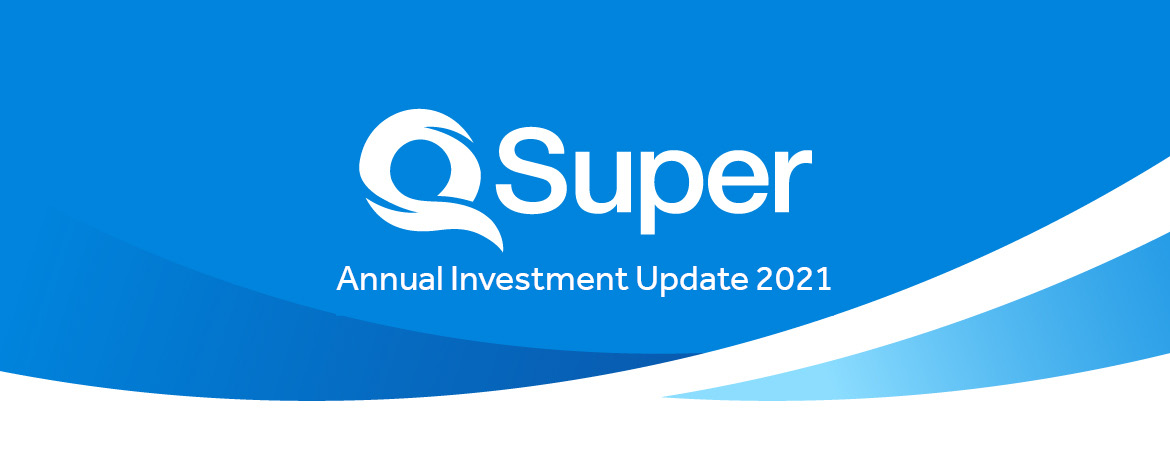Annual Investment Update 2020-21: Key questions answered
01 November 2021
5
min read
QSuper’s Acting Chief Executive Officer and Chief Investment Officer Charles Woodhouse and senior Investments team executives fielded more than 200 questions from members who attended one of our four online Annual Investment Update (AIU) events in August. Here, we address some of the most common topics raised.

Climate change and fossil fuels
Show content
Many members asked about QSuper’s approach to climate change risk, with most expressing concern about whether we are doing enough to combat greenhouse gas emissions through our investments.
In April, QSuper announced our commitment to achieving Net Zero Emissions by 2050 (NZE2050). NZE2050 represents the least-cost transition pathway of the real economy and therefore supports the best investment outcomes for our members. QSuper’s board charged the Investments team with developing and implementing a long-term, sustainable strategy for managing climate change risk in view of its NZE2050 goal.
In late September 2021, following the AIU sessions, QSuper rebalanced its equities portfolio, which significantly reduced the emissions financed through the portfolio. Although divesting of high emitters does not reduce those emissions, it does send a signal to the market that QSuper takes climate change seriously and wants to invest in companies with NZE2050 strategies in place.
Similarly, in our unlisted portfolio, we are working with our external fund managers to ensure the assets they buy and manage on behalf of the fund are also working toward NZE2050.
Engagement and advocacy are also important parts of our climate change strategy. We work with peak bodies, including the Australian Council of Superannuation Investors, the Investor Group on Climate Change, and Climate Action 100+, to influence companies to pursue ambitious climate change targets and transparent reporting.
Many members asked about our new, award-winning retirement product Lifetime Pension.1
The Lifetime Pension can be purchased by retired QSuper members aged 60 to 80 years. An eligible member’s requested purchase amount is combined with the money of other Lifetime Pension members and invested in the fund’s Balanced option for retirement accounts.
Tax-free payments will be made to the member each fortnight for the rest of their life. The Lifetime Pension also has the option to add a spouse to the benefit, which means income will continue to the spouse after the member passes away if this option is selected.
The Lifetime Pension also provides money-back protection2, which means the member’s purchase price will be received as income, and in the case of early death, as a death benefit to their beneficiaries.
Learn more about Lifetime Pension.
Many members were curious about what QSuper’s proposed merger with Sunsuper would mean for investment strategy and options. Because integration planning is still in progress, we can’t say too much about the merger, other than what we have posted on our website. Most importantly, the merger will be subject to legislative and regulatory approvals and will proceed only if the boards of both funds agree it is in the best interest of members.
Returns and investment strategy
Show content
Some members expressed concern about QSuper’s one-year results for 2020-21, which for the Balanced option were lower than that of the median peer fund. Because superannuation is for retirement, we aim for strong, consistent, long-term results.
We are still facing a lot of risk in the economy from factors like potential inflation, coronavirus, and trade tensions, and our strategy is particularly well-positioned to manage market volatility. We’ve introduced more diversifiers into our portfolio, such as safe-haven currencies and precious metals.
Over the long term, QSuper’s Balanced option has been ranked #1 on a risk-and-return basis over the past seven years to 30 June 2021.3
In an environment of low interest rates, governments are focussing on their ability to maintain low interest rates while keeping economies running. QSuper doesn’t expect a recession in the short term because ongoing coordination of monetary and fiscal policy continues to support economies, nor do we foresee a breakout in inflation, which we view as a reflection of the recovery from the pandemic.
Our investments team keeps a close eye on global vaccination and COVID-19 case rates, as well as central bank activity and prices of important commodities like iron ore, copper, and natural gas. As part of our diversification strategy, we have invested in assets that provide natural hedges against inflation, like safe-haven currencies and precious metals.
QSuper holds a variety of unlisted assets across sectors such as real estate, infrastructure, and private equity, private credit.
Some property assets have rebounded since the worst of the pandemic last year. Industrial buildings, for example, have done well as demand for goods and services increases, and multi-family housing has also performed.
The retail sector has yet to bounce back, however, with many workers still at home and ordering products online. Because of liquidity restraints, QSuper does not offer a property-only investment option, but the fund is exposed to this sector through the unlisted investments option.
1. Past performance is not a reliable indicator of future performance.
2. Money-back protection may be subject to legislative maximums and adjustments for negative returns. Further details are available in the QSuper Product Disclosure Statement for Income Account and Lifetime Pension (pdf).
3. Lonsec, media release, lonsec.com.au/super-fund/2021/07/21/media-release-stellar-fy21-returns-as-super-funds-deliver-for-their-members/, accessed 10 August 2021.
The opinions expressed and those providing comments are theirs alone, and do not necessarily reflect the opinions of the QSuper Board. No responsibility is taken for the accuracy of any of the information supplied and you should seek advice for your circumstances.